![]()
The Words The Kwak Family
|
|
The Words The Kwak Family |
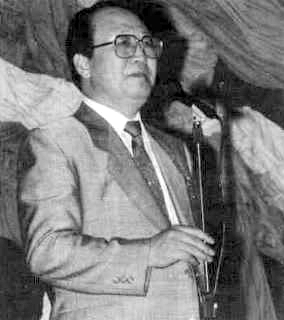
Rev.
Kwak spoke to the RYS participants during the Orientation Week in
Warsaw
Distinguished guests, advisors, participants, ladies and gentlemen: On behalf of the International Religious Foundation (IRF) and its Founder, the Reverend Sun Myung Moon, I welcome you to the fifth international project of the Religious Youth Service (RYS).
The RYS began in 1986 in the Philippines, and has since travelled to Portugal, Spain, Italy, and now, Poland. In addition to these international projects, RYS also sponsors regional projects. Regional projects have been conducted in India, Thailand, and Italy. And next month, just prior to the Assembly of the World's Religions, RYS will sponsor a regional project in San Francisco.
The goodness of RYS is apparent to the most casual or even the most cynical observer. However, I ask you to reflect for a moment on the criteria by which we might measure the success of RYS. In a world dominated by materialism and selfishness, the success of RYS cannot easily be measured -- for the world's desperate pursuit of money, property, power, popularity or bodily pleasure is not a part of the RYS purpose. A materialist, after all, can only measure success in terms of the satisfaction of his or her own self-centered desires. As a result, the true measure of success is never recognized.
The success of RYS, in my estimation, can be measured according to three standards. You may want to reflect on these standards during the course of your time here in Poland with RYS. The first has to do with the human spirit and its relationship with Ultimate Reality, or God. You can see already that I am dealing with standards of judgment which are not commonly accepted in any materialist culture. Essentially, success is counted by the quality of growth which I experience in relation to God. The right relation to God is the foundation of our right relation to the world. Recently, a participant from the 1989 RYS project in Italy wrote the following reflection on her experience:
"I also keep remembering the passage from the Gospel of Matthew, the Great Commandment. This passage speaks very clearly to me of my experience last summer. The passage says, 'You should love the Lord your God with your whole heart, with your whole soul, and with your whole mind. You shall love your neighbor as yourself.' We all expressed who our God is in many different terms, but the faith was so strong and genuine in each of us."
This participant was able to grasp a central lesson of the RYS experience.
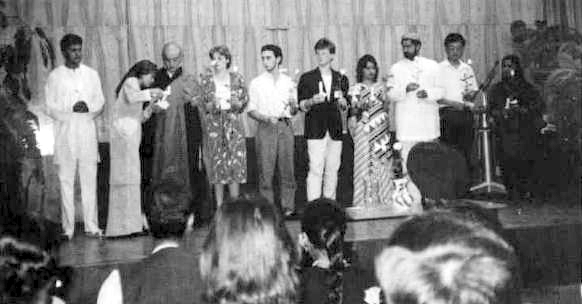
Representatives
from different faiths lit candles to symbolize their love and unity
during the Interfaith Prayer
The second standard of success has to do with the growth in the quality of our relationship with others. While the first standard may be understood as having to do with vertical love, this second one has to do with horizontal love.
Both dimensions of love are necessary and related to one another.
I think we can all agree that one of the most painful of human experiences, apart from physical pain, is the pain that derives from unhappy relationships with others. We all know of family relationships that have led to deep psychological and emotional pain. Likewise we know the pain of betrayal by a trusted friend. Even war can be understood as the result of bad relationship between communities of people. The very term enemy is used to describe another human being or group who seeks to destroy or undermine what we regard as sacred. One of the deepest teachings of religion, however, is the love of enemies. The person who can learn to love his enemies is truly a victorious person.
Through RYS we have the opportunity to become victorious people in that area which is most painful to all humanity, namely human relationships. Unfortunately, even religions often characterize other religions as enemies. RYS gives us the opportunity to end these traditions of hatred. No one who has hate in his heart can be counted as truly happy. Only love can defeat hatred and heal the wounds within us and among us.
Finally, let me suggest the third standard which has to do with our work or labor. As you know RYS involves hard work. But life itself requires labor. For example, if we are to eat, we must cultivate and care for the land. If man's only focus emphasizes labor itself, we eventually become tired and life becomes difficult. The result of this kind of condition is painful and unhealthy. Yet, when under certain motivation, especially higher ideals of pure love and unselfishness, man will achieve dignity, value and pride. Motivation for work is very important, particularly when that work is linked with the Absolute Being. The joy of labor will only come on the foundation of an ideal of service which is grounded in the love of God and the love for one another. The dignity of labor cannot be separated from the dignity of human beings, which in turn is rooted in the recognition that our origin is in God.
The world is now in a special era. The hope is pointing to a new world and a new culture. Rev. Moon has taught us that under God's dispensation all human beings are one family of brothers and sisters. Beyond our religion, race, and habits from traditions that we have grown up with, we have to become one family of brothers and sisters. Please look around you here in this room at the variety of individuals who have gathered. We are people of different color, nationalities, backgrounds and traditions. This summer experience for you is very important for your future. So, my hope for you throughout your whole life is that you keep an open mind, not a narrow mind; live with deep traditions, not narrow ones; and embrace all people not just those from your own nation or tradition. We will all benefit by adapting God's idea, which is one world under God.
We are living at a time of great importance. The events in Eastern Europe that have been taking place over the past year are evidence of a radical opening to new ways of thinking. The old ideologies, of communism, democratic capitalism, ethnocentrism, nationalism and religious exclusivism leave much to be desired. The world is in search of innovative ideas and creative solutions to old problems. The young people of the world always bring new light and a spirit of openness. Through your work with RYS you will be greatly enriched. But more importantly, through your example the world will experience new hope.
May God bless you. Thank you very much.
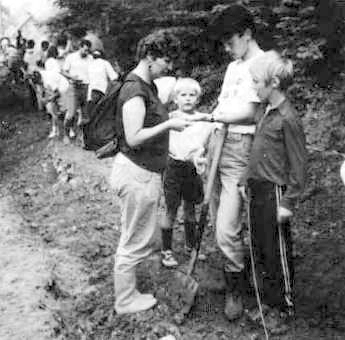
Ruth
Robinson, a nurse and a participant, takes care of one brother's
blister
About a year ago no one thought that the East European countries would be able to liberate themselves from decades of atheistic regimes. Therefore, that the Religious Youth Service (RYS) could hold their 1990 project in Poland was a tremendous step forward in their vision for world peace.
Although my previous understanding about RYS activities was very limited, I accepted their invitation early this year to participate as a staff member and nurse in the program. I determined to give my best and to contribute as a pillar of love and faith to my still "unknown" brothers and sisters. I arrived in Warsaw, Poland one week ahead of the arrival of the other participants, who came from 45 nations and represented many different beliefs. I could spiritually and physically prepare by helping the central staff in their final arrangements.
This year's summer project began with a three-day leadership seminar for all site-leaders, assistant leaders, group-leaders, nurses and doctors, led by Drs. Ron and Sherry Burr. Topics covered were how to develop respect for different cultural and religious traditions, conflict solving, group dynamics, and the RYS vision. Its impact on my heart and mind was deep, preparing me for unexpected things that would also challenge my inner heart in the weeks to come.
RYS participants from various parts of the world arrived over the next two days and people would get acquainted in very unconventional ways. Nawaal, my new friend, was dressed in a traditional Islamic black outfit up to her head and melted my heart from the very first night when we embarked on a long and deep discussion about differences in the Islamic and Christian faith. Agata, my Polish sister, wanted to know all about the Unification Movement and the life of Rev. Sun Myung Moon. Sibu, a Buddhist monk from Bangladesh with a deep-hearted smile constantly challenged me about "service to others" and his "non-violent" way of thinking. And finally Amarjit from India gave me a deeper view into his Sikh religion. All this happened in the few days we stayed together in our meeting place about 25 miles outside Warsaw.
As a foundation for our future work activities, different scholars presented to us their ideas for world peace. "Man's approach to the Divine" by Dr. Francis Clark, let my mind expand to a broader level through his expression of God's vision of a worldwide family. Dr. Vera Mehta, Secretary General of the International Association of Social Workers in Austria, spoke about the importance of fundamental values and self-healing -- that world peace and brotherhood is only possible if old and new wounds inflicted through misunderstanding, wars and apathetic behavior in our hearts can be healed. She stressed that any kind of social transformation for the betterment of all can only come through personal transformation. Only if we are healed ourselves can we help others.
Dr. Paul Mojzes from Yugoslavia gave us deeper insights about Polish political and religious history: how the atheistic ideology of the communist regime could infiltrate for 45 years into the minds and daily lives of people, yet could not destroy their hearts and strong belief in God and the Roman Catholic faith. Dr. James approached the quest for world peace through environmental and ethical issues. He mentioned that East European countries are challenged not to repeat the mistakes of the industrialized nations. He appealed for the unconditional responsibility of the individual in order to achieve spiritual and physical harmony. Father Frank DeGraeve of Belgium was like a spiritual father for us all. In his loving understanding many brothers and sisters could feel this man had broken religious barriers and achieved reconciliation of the past with the present by putting Heavenly Father in the central place in his heart and mind.
"The Ecumenical Vision of World Peace" presented by the Drs. Ron and Sherry Burr of the United States, clarified the alignment to the vision which Father expresses: "Man's unity with God is not a matter of beliefs and doctrines in the mind; it must be expressed in actions of love and service to others. This is a fundamental principle of all religions. They may have different names for the Divine, but they all teach us the ideal of service to others."
These were the highlights in our preparation for the coming four weeks of service, inter-religious dialogue, and cooperation. We divided up into three different site-groups. Project I went to Zakopane, which is situated in a mountain area near the border of Czechoslovakia, to serve a variety of community needs in co-operation with the town hall. The city had requested that RYS refurbish several school buildings that support rural education. Project II was in downtown Krakow, the medieval capital of Poland, where our participants helped to build a new housing wing for a school used by the visually handicapped. Polish soldiers would join hand-in-hand in their work as well.
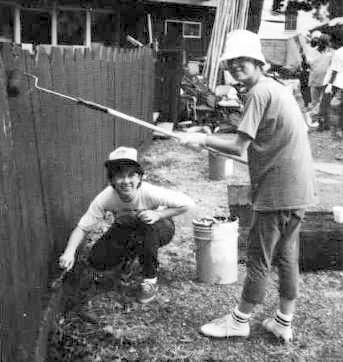
Work
progresses at the NAAP work site
Project III, which I participated in, was situated about 20 miles outside Krakow in a small village called Karniovice. Its beautiful rural environment on the foot of a long rocky hillside, invited us young people from more than 25 different nations to join into the daily life and work of its native people. Over many years this area was lacking running water and our task was to dig and lay pipelines that would assure clean running water to about 100 homes. Besides the obvious benefits of running water this project would also give an economic boost to the community by allowing the farmers to increase their livestock.
Arriving in Karniovice we all were warmly received by the village Mayor, the regional Mayor, the Director of the Agricultural Center where we were lodged, and many village people. At our very first meeting our site-leader couple from Bangladesh broke the ice by immediately asking, "Please call us Kazi and Azizun. We are your elder brother and sister and not your site- leaders or your boss. Let's help each other to form a large single family, so that we all can feel at home, excluding nobody." I could feel God speaking through them and was amazed how each participant was so receptive to such guidance. After a few days Kazi and Azizun became the loving respected parents for all of us.
Our work started daily at 6:30 a.m. with a morning service where a brother or sister would offer his or her spiritual guidance according to his or her faith and tradition.
After breakfast we would walk to our work place (about 10 minutes away) where Martin, a Polish engineer, and Bruce, a technical assistant from Canada, would inform us about our task in digging the 1.5 meter deep trenches. Before we got our spades and shovels, we would gather in a circle and offer a small prayer to God. In this gathering usually neighbors and their children would join as well.
The first three days were tough and challenging for each one of us. Nobody was used to such manual work and soon I was busy taking responsibility as site nurse in caring for those suffering from blisters on their hands, back pain, and sore shoulders. Here someone needed to be treated because a small accident occurred, or there someone asked for drinks. Others had to be encouraged to slow down in working. Azizun offered to take someone's spade if that person was tired. Rick, although sore and in pain himself, gave massages to others, always concerned that everybody felt well. Around 10 a.m. a mother from a nearby house where we were working would offer us tea and homemade Polish cakes. During such breaks we could deepen our relationships to the Polish people and soon everyday a few of our group were invited to have dinner with them. Around 1 p.m. we finished work.
In the evenings we would come together to listen to someone's presentation about his or her homeland, followed by lively discussions concerning their politics, culture, and religious beliefs. "Women and Religion" was another topic proposed. The role of Women in Hindi, Moslem, Buddhist, Sikh and Unification Church traditions promoted a comparative dialogue and one could hear how the roles of women had changed throughout history.
When Fenggang from China and Amarjit from India got sick, we prayed for them, visited them, and lost sleep because of them. A piece of each of us was missing until they returned and were healthy. When Martha from Mexico was sad and wanted to be alone, Martin from Cameroon and Sharish from Syria picked flowers in the fields to lift her up. Kazi composed and sang a song in Hindi for us to express his vision of our common humanity that transcends our different races, religions and genders. His music and love for all of us brought us closer together.
Several times we had the opportunity to visit Krakow. The Basilica of the Blessed Virgin Mary takes a central place in people's hearts. Every hour a bugle call is made from its tower. Legend has it that during one of the Tartar invasions in 1214 an enemy arrow pierced the throat of the watchman who was warning the inhabitants. In memory of this occurrence the bugle call breaks off abruptly to this very day. In 1978 the archbishop of Krakow was elected 264th successor of the Pope in Rome as John Paul II. This is the pride of every Roman Catholic in Poland today, since he is the first non-Italian pope in 455 years. We had a chance to visit his birthplace in Wadovice and met with one of the Pope's schoolmates.
Our work in Karniovice was advancing day by day, and sometimes other site-leaders visited us. The regional Mayor was always interested and came a few times to speak to us during our project. The village children helped with their own small spades. Towards the end of our stay, national TV crews showed up and some of our brothers and sisters had the opportunity to speak about their work, the RYS vision for world peace, and their experiences with the Polish people.
In all our activities, the aim to realize a harmonious interracial and inter-religious family was stressed. For such a vision a healthy spirit as well as a healthy physical body is required; therefore lectures on a holistic approach to a healthy life were presented as well. I had a chance to explain the interaction of the spirit and the physical body from the Divine Principle understanding, and our English brother Rick showed us how to apply massage, pressure points, and meditation for self-healing.
One weekend all 120 participants joined together in Zacopane. I could not attend and had to stay back, as one of our brothers needed medical care. Rachel Wood from the United States expressed her experience as follows: "If one could find a place where the magnificence of the Divine could be felt it would be Zakopane. The high-peaked mountains of Zakopane give one the impression of the limitless vision of a transcendent glory that can only be grasped though the soul. Radon from Bulgaria and Anna Bella from Guatemala played their guitars and sang songs which seemed to be an offering to God, a gift in return for the beauty of the mountains."
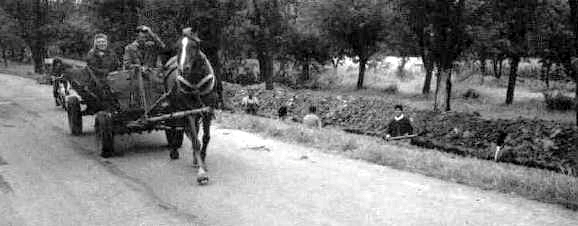
A
Polish farmer and his wife greet the volunteer diggers in Karniovice
One dark chapter in Poland's history is the Auschwitz concentration camp. Before our visit there, Yair from Israel gave us deeper insights into Jewish history. We visited a Synagogue and saw a movie on the Holocaust in preparation, as several of our participants were not aware of those tragic historical facts. A long and deep-hearted discussion at home by candlelight followed our visit to Auschwitz. Everyone had an opportunity to express his feelings about suffering and war. Many tears of reconciliation were shed and we became aware that today brothers and sisters are still living in war-stricken countries. Vara from Sri Lanka expressed his feelings about the war in his country, and how he had to escape leaving his whole family behind. Kazi recalled his experiences as a freedom fighter in Bangladesh. Joseph from Uganda shared his heart about the "Children-armies" which were set up in order to liberate his country, Uganda, from the dictator Idi Amin. This honest speaking and sharing touched my heart deeply and I could understand how much Heavenly Father must suffer too. I felt that when we come to understand each other on a level of relationships, heart to heart in politics, economics, science and religion, then our hearts will mature to where the desire to dominate or kill someone is not there anymore. Communication is the expression of the soul, of the life around us and the internal and external communication with God. It is a testimony of our thoughts, feelings, willpower, and oneness with reality. RYS is opening a tremendous potential through educating young people to become future leaders of heart and dialogue. Hearing brothers and sisters' hopes for world peace I could understand that having no hope that humanity can change is called apathy, and is one of the results of human suffering.
Toward the third week of working at our site we could start laying the water pipes with the help of the local people. Soon we would get the final okay from the water department in Krakow that the pipes and running water would meet the necessary standard. That meant we could start filling those trenches. Everyone felt the excitement as we progressed toward the achievement of the project. Sany, Vara, Nalin and Mary came up with the idea of printing a Karniovice Diggers' Journal which would record each participant's unique character and behavior during our stay. Also we recorded each participant's feelings and thoughts on a videotape.
At our closing day the officials of Karniovice and the President of the Agricultural Department in Krakow, commemorated our work by placing a memorial-plaque at the water purification plant in honor of RYS. Good-bye parties were arranged with the village people and many deep tears were shed on the day of our departure.
In our last week, all 120 RYS participants joined together once more in a beautiful former Franciscan Monastery. The whole building was transformed under the communist regime into a hotel-bar and dancing place for the village of Chiney. A few hours after arriving at this retreat building and realizing that this Catholic sacred place of worshipping God was transformed under the communist regime, I could feel the once- existing breath of faith everywhere I walked. The Chapel, which became a public bar, still testified to the greatness of its construction and its offering to the Divine. In the corridors I felt the sound of prayers prayed and songs sung which today are silenced yet still live in the walls of the Monastery. The dining hall, which is from the 6th century when architecture was the expression of man's relationship with God, let my heart feel the cry of my Catholic ancestors for reconciliation. Not knowing how to digest such agony of pain I turned to Father Frank, during our silence period, for spiritual guidance. In our discussion I could realize that we ourselves have to be the living stones able to give love and deeds in our daily life. I realized too that God's hope for all Unificationists is that we may be able to not only uphold the sacred faith of our ancestors, but to transcend their faith. The sacred love in each one of us will become the cornerstone for God's new world community. After this understanding my heart and mind became very peaceful and my walks through the Monastery brought joy to my soul. The next morning the Monastery authorities allowed us to celebrate Mass, which was the very first one in the Chapel since 1945.
RYS has taught me a great secret once again in my search for world peace: to be tolerant and open-minded, and to listen to others however different their opinions may be. Everyone is a searcher in matters of spirituality, so there is a lot to learn from each other. Love is the heart of religion, and true religion ought to offer practical love. RYS 1990 in Poland was surely living up to this standard because brothers and sisters with various religious backgrounds made it possible. Our site-leader couple, Kazi and Azizun, once asked, "What is it that brings harmony and unity between people around the world?" I think 35 people replied to them over a period of four weeks: "Love brings such things!" But with love must also come trust, fellowship and laughter. All these things we gave to you, Kazi and Azizun, because you gave them to us.
An informal publication initiated by several brothers and sisters during their RYS experience in Poland.
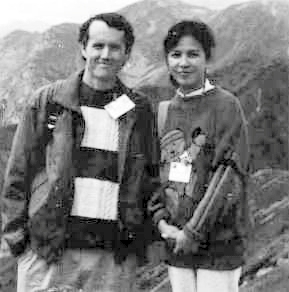
Arlene
Arevalo Karita together with Gary Young, the director of RYS, in
front of the Tatra Mountains
"The firefly shines only when on the wing," so runs an adage. Religion comes to life when practiced and inter-religious harmony come about when religions not only dialogue but also translate their common understanding into a united, purposeful and active service. This aspect of providing avenues for inter-religious harmony is an element that stands out in the Religious Youth Service. In RYS, religions come alive.
That RYS is a gathering of Unificationists, Christians, Muslims, Jews, Buddhists, Hindus, Sufis, Sikhs, Jains, Confucianists, and Zoroastrians -- or that is a gathering of religious leaders, academicians, students, and members of local communities -- is an understatement. It is a coming together of minds, hearts and hands, and each one is tossed onto one another, freed from its boxed domicile unknown to the rest. I remember being so moved hearing one participant sum this up: "... Before I came to RYS, world affairs was just another story. I listen to the news and hear about things that are happening in Poland or, maybe Israel, and it would touch me a little bit but not deeply enough. Now I know people in these countries and therefore, this would have a greater impact on me when I go back home. When I hear about an earthquake in Mexico, I feel it because I have a friend there..."
What is particularly fascinating about RYS is that it pools together a diverse group of personalities, cultures, and religions not for fellowship per se as its end, but for fellowship in the name of service. We were out there to extend our horizons to a deeper understanding of God's love.
There were rough edges, too, for RYS is not just a bed of roses. Our physical endurance was tested. We had to lay "brick upon brick, upon brick." We aired sometimes that our tools were not sophisticated enough. Or that digging the ground was almost endless and scraping the old paint on the walls or sanding the wooden building was unbearably monotonous. There were times we were too meticulous about the food -- or, maybe, about the person we were working with.
Our pride, too, was tested to find if it was authentic borne of appreciation for the values and learnings gained -- or if it was just an empty slogan borne of a false sense of superiority.
In Poland, we did not only see the lush palaces like the Wilanow Palace in Warsaw or the Dom Polomni at Pultusku. We were not only entertained by the Chopin concert in the famous Wazienki Park. We did not only enjoy trekking the famed "Cradle of Slavdom," the high Tatra mountain range in Zakopane. We did not only have a pilgrimage to the holiest of Polish shrines, Jasna Gora in Czestochowa. We did not only ferret out memorabilia in Krakow. But we also saw the pale smog in congested areas and heard about the accelerating inflation that was a real hardship for Poles. We also met refugees from Iran. Most intense of all, we visited Auschwitz and Birkenau Concentration Camps and saw the barbed wire fences, human extermination factories, empty cylinders of Cyclon B (a gas used to suffocate masses of prisoners locked into airtight chambers), and piles of hair, clothes and shoes of all sorts -- men's, women's, and children's, and even incinerated spectacles and crutches which were salvaged from the dead. The very awareness that more than four million human beings walked, toiled, suffered, and died on those grounds made our steps heavy. "What I saw was not just a ghastly memento of the beastly Nazis," reflected one participant. "It was not just a reminder of a sorry event that took place sometime in our history. It is a lesson for all of us and a reminder that we too share in that beastly aspect which is within us."
Our culminating activity was a beautiful experience -- each one, with a lighted candle, went around the big circle, thanking and giving farewell wishes to everyone. It was very moving to see a Jewish participant embracing a Buddhist, or a Christian tearfully saying good-bye to a Muslim, or a Hindu thanking a Sikh… Where else in the world can one see this? It was a beautiful sight -- and not only so, it was also an affirmation that unity in diversity can indeed take place and that the gaps among religions, cultures, races, nations, and personalities can be bridged -- as each one tries to bridge the notches within.
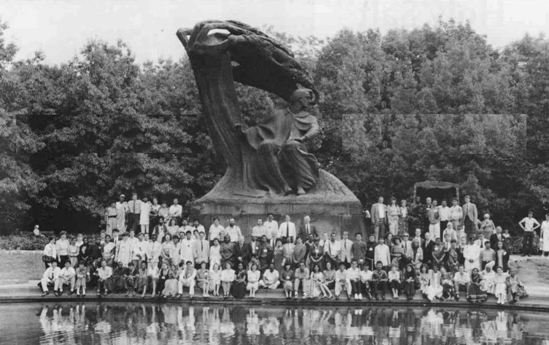
The
RYS group in front of the famous Chopin Statue located in Tazienki
Park in Warsaw, Poland
Please take me home with you and let me live with you in your country. Think of me when you see different people, when you hear misunderstanding or when you feel disagreement. Then please talk as we talked, work as we worked, laugh as we laughed, and cry as we cried.
For I will surely carry you home with me. I will see your eyes, your expression and remember your way. So, I will look differently at others because you give me different eyes. The respect you showed me makes me larger, rounder, more human, and more divine. I will carry your respect like an exotic jewel wherever I go and show it to others. Thank you.
On June 25, 1990 I, alongside five other Indian participants, arrived in Warsaw to participate in the RYS '90 Poland Project. After two days I started feeling homesick -- maybe due to a new environment, a food I was not accustomed to, or not so friendly relations with other participants. Today, almost one month later, I don't feel like going back. I wish this project could continue and we could keep on sharing our joys and sorrows with each other. Why such a drastic change? I ask my inner self and receive the answer. Because in this short span of time I entered a new world -- a world which I never knew. I could not imagine that the people here would be so affectionate and lovely. I realized they were when we had a formal but warm welcome at the airport from Rachel and others; when Mariosh, a car driver, expressed his desire to work at our site just because I referred to him as my brother; when I joined hands with a woman named Sandy, who was sturdier than a man, to dig in the hard clay soil; and when I fell sick, I felt the concern of al I the participants and local community. All of this I will never forget. Nalin would not let me go out of his sight until I fully recovered. Kazi and Azizun never let me work hard after my illness. Yu brought a flower bouquet along with good wishes for my health. The love and affection I received from these people made me feel as though I was their younger brother. Mary Johnston's voice will keep on echoing in my ears throughout my life perhaps. Bruce and a lovely girl named Stephanie keeping spoons, forks and food on the dining tables made me realize that here no one is selfish. Sister Ruth and Rick gave massages to tired and energetic workers at the work site. Shanti washed the clothes of other participants. Kasia translated English and Polish always with a smile on her face. The ladies in the kitchen always "talk" and made me feel as if I was in the kitchen of my home.
A receptionist, Ala, gave me motherly affection and took me to her house twice. Her daughter Egues did not accept the money for my medicine. Cooperation and friendship of people such as the Novaks, Mariola Teresa, Lidka, Swavik, and others helped me overcome my prejudice that Europeans lack love and affection --
And this is not the end. So many other incidents and events have tied me with unbreakable bonds that when I think of August 3, 1990, the day I shall go back, I feel like crying. Can you help me? But for all this, I remain indebted to RYS for bringing me to this new world..
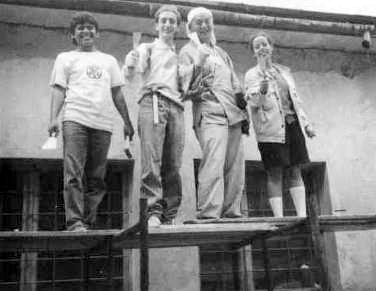
A
moment's pause from scraping the army barracks which would be
transformed into a kindergarten building
RYS in Poland
In this summer in Poland
While serving the people
For love
so long forcefully denied
My eyes opened.
And behold I saw the
whole of mankind.
God watching from every corner Crying out "Peace!"
Man
returning woe
RYS in the heart of Poland
Humble with humility
so rare The Youth in unison promise
Love, Unity and Peace.
In service and worship
To create but everlasting harmony
And
behold
God so pleased.
To RYS He gives
the duty of man's
custody.
My director said, "What? You want to quit work to go to a
Christian country?"
I felt depressed.
My secretary said,
"Why? Don't you know that it is pointless to work for the
Christians?"
I felt hurt.
My colleague said, "How did
your parents allow you to make such a decision?"
I felt
remorse.
My Imam said, "Go, my child. Prove to the world that
true
Muslims are not biased."
I felt God.
Peace Amidst Chaos
Twenty-six is the day it started.
June is
the month of this blessed day.
A beautiful experience, if I wanted
"Pokoi I Milosc" everyone would say!
Peace, Peace, Peace
But there's no Peace.
With this I am led to ask,
"Are people so sick?
Is
Peace so unattainable?
Is chaos inevitable?"
But wait...
Yair and Sharif talking?
Pakistani with Indian
Hindu?
Muslim and Christian dining?
How I wish they do?
Yes,
they really do!
I see no black
1 hear no white
I want to go back
But back
to what?
An eye for an eye A tooth for a tooth
A land and grave
to die
And a soul to lose.

The
Indian participants entertained the group with a special cultural
dance
A weak wind was softly blowing,
By the silent Krakow
riverside,
The memory can't be forgotten,
It aroused a lot of
my thinking. Ah! Ah! We are recalling,
In the RYS' days,
That
for God's revelation,
We were together working and living.
In
the common working and learning,
We built up a deep emotion. In
order to strive for the world,
We were gathering but parting. The
weak wind was gently blowing,
By the silent Krakow riverside,
In
the flowing water,
An infinite deep emotion was born.
(Sung to an RYS group in Chinese)
We all come from an intellectual sphere. We all knew the concepts of work and service; but here there's no more theory.
We found ourselves shoveling away our comfortable world of ideas.
So at night I repeat dzienkooyeh. We knew that after all we are equal. We've heard of tolerance and acceptance; but here we found ourselves praying and joking without considering our backgrounds;
We just enjoy what is common in all of us.
So at night I repeat dzienkooyeh.
We knew that simple life is gratifying. We've heard of the peace of a farmer's life; but here we didn't need our suppositions.
They smile to us and strip off our conceptions; we eat with them as if we acknowledge the rewards of working hard.
So at night I repeat dzienkooyeh.
We knew of Poland and their faith; we've heard of their pride in their Pope; but here in every corner an altar reminds us of the strengths of a religion that brings a nation to solidarity. So at night I repeat dzienkooyeh.
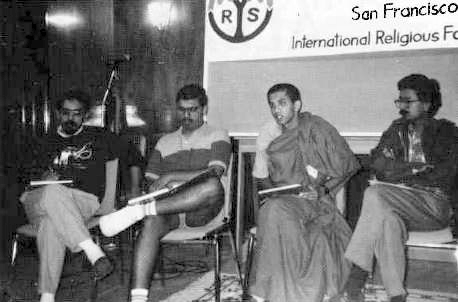
Multi-faith
panel discussing their religious solutions to problems
Adena is a Jewish RYS Alumni from South Africa
RYS in San Francisco started with warm greetings of old friends, handshakes, smiles, rekindled laughter and memories as young people from east and west, north and south met to affirm their commitment to world peace through inter-religious action. This was the scene of the regional Religious Youth Service held in the breathtakingly beautiful city of San Francisco. Some 35 participants, representing nine religious traditions and eleven nations, came together from August 5-15, 1990, to give to others and thereby give truly of themselves.
This RYS program gave participants the opportunity to come together and share, by living and working together, the basic common denominators that unite all peoples of the world -- the fact that we are all God's children, created to work for the betterment of our crumbling universe.
Owing to the fullness of our program, I have elected to write about some incidents and events which made a lasting impression on me, and which have significance in the sphere of religion and culture.
The program was divided into three parts; the orientation program, our work schedule, and cultural and religious events and outings.
Our orientation day was very rewarding and informative. Dr. Frank Kaufmann, Executive Director of the Council for World Religions, gave a succinct and thought-provoking presentation entitled "What Role can The Religions of the World Play in Shaping the Future?" He pointed out some of the major trends in contemporary religious thought and encouraged debate and questioning from the participants.
Following Dr. Kaufmann's talk selected alumni gave short presentations on "What is the RYS experience?" The sharing of their experiences gave the new participants some idea of the great reward received upon completion of an RYS program.
During the orientation evening Pat St. Onge Cole, a senior representative of Habitat for Humanity, addressed the RYS group. She explained how Habitat for Humanity works with volunteers to assist fairly low income earning families to build and restore houses for themselves.
I felt enriched after our orientation day and gained a great deal from the presentations of the high caliber speakers to whom we listened.
On the second day of the program, we were divided into two work sites. The group in which I was placed arrived at the Native American Indian center and stood on the empty plot where we were to build a traditional prayer arbor. Our work began each day with prayer. As we all stood in the cool misty morning air, with linked hands and bowed heads, we thanked God for the opportunity of allowing us to give and for uniting us.
The other group worked on the Habitat for Humanity house: padding, paneling, and painting the outside, which was to be inhabited by a family of nine people.
We all toiled in the hot sun for the entire morning each day, but our work became increasingly rewarding as we saw the outside of the house nearing completion and the arbor taking shape. With the knocking of each nail, and with each bead of sweat, we knew that the fruits of our labor would provide a family with a dwelling and those Native American Indians who had turned to drugs and alcohol with a chance to restore their lives by returning to God through prayer and ritual. It was a great honor to participate in such a mission.
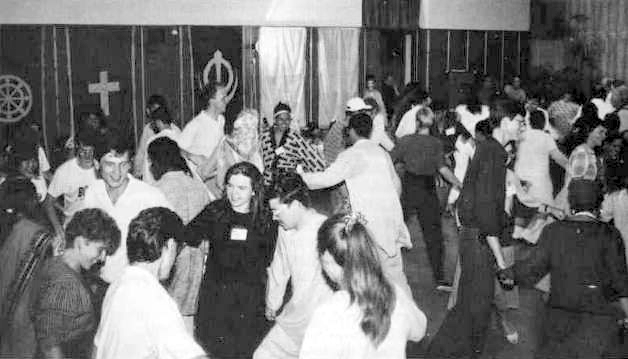
All
the participants enjoy reeling together during a folk dance
We also participated in several cultural and religious events which greatly enriched our experience. An ambience of peace and tranquility settled over the group with our visit to the Green Gulch Meditation Center, where a Zen temple stands in the valley, amidst the tall trees and majestic mountains. During a short presentation by a Zen nun, we were given some insight into the Buddhist way of life. The entire center was infused with order, serenity and the beauty of nature. Our visit to the center was spiritually revitalizing and uplifting.
We were fortunate that Lord Krishna's birthday fell during the time of the RYS program. We participated in the Jammastrami Celebration at a San Francisco Hindu Temple. On arrival we took part in a traditional Hindu meal. For the Westerners amongst us it was a true treat, and for the Hindus it was a wonderful opportunity to taste the traditional food with which they are familiar. Following dinner, we entered the hall, magnificently adorned with flowers, to pay tribute to Lord Krishna. One by one we honored the statues, which stood perfectly white, bathed in bright warm light, and representing the various manifestations of deity. This was an opportunity for some of us that we may never again have.
During the RYS cultural night, a sense of close brotherhood and sisterhood always triumphs, as participants perform a small sample of their own religions and cultural traditions. It is an evening of brightly colored dress, song, dance, music and festivity. It is always astounding to see the numerous hidden talents of the participants. It is a night which unites all religious traditions in a spirit of fun and spontaneity. A great time was had by all.
Turning back to the more intellectually orientated part of the program, we were honored to have leading scholars in the field of religion and culture come to talk to us.
Rev. Judy Wellington and Rev. Paul Shultz, two highly respected Native American Indian leaders, addressed us one evening at a picnic site just outside the Muir Woods. As we sat bathed in the cool shade of the Redwood trees, the two speakers pointed out many of the difficulties faced by Native American Indians in contemporary American society and explained the need for them to return to their traditional religion in order to restore their often fractured lives. These presentations were most moving and valuable. Dr. Francis Clark addressed the group during one of the evening programs. He gave us an informative presentation on "Currents in the World Interfaith Movement and the Vision of the Assembly of World Religions II." Those who were to participate in the Assembly of World Religions had their appetites whetted by Dr. Clark's graphic description of the nature and magnitude of the gathering.
On the closing night of the program Dr. Jocelyn Hellig, a senior lecturer in World Religions at the University of the Witwatersrand in South Africa, presented a talk on "The Role of Religion in Transforming South African Society." She discussed the way in which religion operates in South Africa in the context of a multi-racial society. Her aspirations for a shared, non-racial future for the people of troubled South Africa gave inspiration and hope to us all. This talk demonstrated the need for dialogue and action in solving the multifaceted problems facing our world.
The last day of an RYS program is always one filled with a feeling of gain and a sense of sadness. This was exemplified most clearly at our closing ceremony at the Native American Indian site. As we sat on the benches within the walls of the arbor we had created, each Native American Indian from the center, who had watched with keen interest the daily development of our work, individually thanked us for our hard work and the assistance we had provided them. They thanked God for the chance of witnessing the unity of young people from every corner of the globe, for when on God's earth do people unite to give so freely of themselves?
We owe our gratitude to Father Moon, for it is through his vision, insight and love of his fellow human beings that our lives were enriched by helping to create a better future for others.
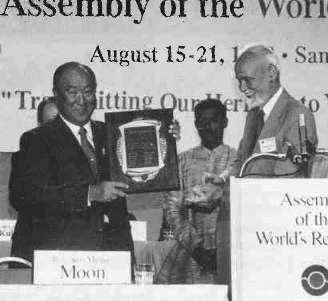
Dr.
Huston Smith presents a plaque to Rev. Moon as the founder of RYS,
expressing the appreciation of all the participants
We are gathered here to celebrate our unity and our diversity. As pilgrims for world peace, we come from the lands of our respective cultures and our histories. Together we seek a better understanding of our respective heritages which are our gifts to the generations to come.
This Assembly of the World's Religions says to all humanity that that which binds us together is stronger than that which divides. In our love for one another and the respect we show to one another's beliefs, we seek and proclaim life's balance. (Inter-religious dialogue is essential for our common future in the global village.)
For Rev. Moon, the global village has been his home, the world's religious leaders have been his family, and the harmony among religious traditions has been his mission. Over these many years, Rev. Moon has focused his vision and his resources on furthering peaceful relations among the world's believers.
This has been especially true in his dedication to youth. The theme of this congress testifies to this, for our theme is "The Transmission of Our Heritage to Youth and Society". We all recognize the need to guide educate and inspire the younger generation to take responsibility for leadership. As each of our traditions extols the moral dimension of life, we must provide avenues for young people to experience the potential harmony of faiths while working for the good of all mankind.
Since 1981, the International Religious Foundation has sought to build bridges of harmony and understanding through two programs for youth. First, The Youth Seminar on World Religions, followed by its successor, the Religious Youth Service. During the first Assembly of the World's Religions in 1985, Rev. Moon announced an 'inter-religious youth movement centered upon humanitarian service.' Now, through the work of hundreds of RYS youth volunteers, we have seen the results of this vision, which innumerable members of this Assembly have supported.
The RYS is a unique program in interfaith cooperation. It seeks to go beyond dialoguing to put into practice interfaith and intercultural living. RYS provides life-changing experiences for those who give their hearts and bodies to people who are in need. Their labors are a tribute to the human spirit.
In the course of the past five years, the RYS program has carried out its successful projects in the Philippines, Portugal, Spain, Italy, Thailand, India and most recently in Poland. Among the many participants of this Assembly, there are those who have served in or otherwise supported these projects, and it is their individual testimonies that speak loudest on its behalf.
RYS is a movement that gathers momentum and vitality. In the past two weeks, a project was sponsored here in the San Francisco Bay Area as part of the work of this Assembly. It is my honor here to introduce those young persons to you.
This dedicated group helped to serve the American Indian community by building a meeting place for religious events and to help the organization, Habitat for Humanity, which builds home for the homeless.
But after all is said and done, the highest recognition for this project must go to Rev. Moon, for his dedication to youth, to humanitarian service and to the vision of "inter-religious action for world peace."